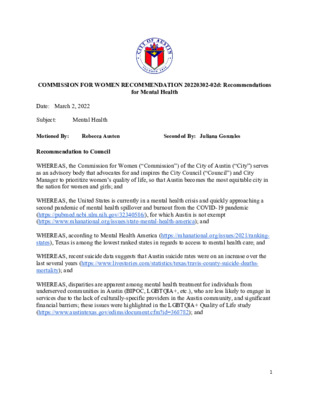20220302-002d: Recommendations for Mental Health — original pdf
Recommendation

COMMISSION FOR WOMEN RECOMMENDATION 20220302-02d: Recommendations for Mental Health Date: March 2, 2022 Subject: Mental Health Motioned By: Rebecca Austen Seconded By: Juliana Gonzales Recommendation to Council WHEREAS, the Commission for Women (“Commission”) of the City of Austin (“City”) serves as an advisory body that advocates for and inspires the City Council (“Council”) and City Manager to prioritize women’s quality of life, so that Austin becomes the most equitable city in the nation for women and girls; and WHEREAS, the United States is currently in a mental health crisis and quickly approaching a second pandemic of mental health spillover and burnout from the COVID-19 pandemic (https://pubmed.ncbi.nlm.nih.gov/32340586/), for which Austin is not exempt (https://www.mhanational.org/issues/state-mental-health-america); and WHEREAS, according to Mental Health America (https://mhanational.org/issues/2021/ranking- states), Texas is among the lowest ranked states in regards to access to mental health care; and WHEREAS, recent suicide data suggests that Austin suicide rates were on an increase over the last several years (https://www.livestories.com/statistics/texas/travis-county-suicide-deaths- mortality); and WHEREAS, disparities are apparent among mental health treatment for individuals from underserved communities in Austin (BIPOC, LGBTQIA+, etc.), who are less likely to engage in services due to the lack of culturally-specific providers in the Austin community, and significant financial barriers; these issues were highlighted in the LGBTQIA+ Quality of Life study (https://www.austintexas.gov/edims/document.cfm?id=368782); and 1 WHEREAS, the Reimagining Public Safety Task Force 2021 Mid Year Recommendations report (https://www.austintexas.gov/sites/default/files/files/Completed%20RPS%20Taskforce%20Mid- Year%20Recommendations%20Report.pdf) highlights the need for mental health resources allocated to the community; and WHEREAS, on June 22, 2020 the Commission for Women passed Recommendation 20200622- 03A1: Race and Gender Equity (https://www.austintexas.gov/edims/document.cfm?id=342481), which included a recommendation to address disparate economic, health and safety impacts on women of color resulting from the COVID-19 pandemic; and WHEREAS, on April 17, 2020 the Commission for Women passed Recommendation 20200417- 03C: COVID-19 Responses for Women and Girls (https://www.austintexas.gov/edims/document.cfm?id=339033), which highlighted the physical and mental health issues affecting women and girls as a result of the pandemic; NOW, THEREFORE, BE IT RESOLVED, the Commission for Women recommends the following for the FY2022-2023 budget, to address the mental health needs of women, girls, individuals who identify as female, and the broader community: ● The City of Austin prioritize funding to diverse communities regarding mental healthcare, particularly for BIPOC and transgender individuals, including specific recommendations from the LGBTQIA+ Quality of Life Study. ● The City of Austin allocated $250,000 to implement the Reimagining Public Safety SSVVP group recommendation related to creating a mental health referral fund. ○ This funding should be contracted to grassroots, community-based organizations rather than administered out of APD, so as to increase access for all community members. ○ If the funding remains in APD, it should fund an administrator position in Victims Services. ○ The funds can be used to expand the current EMDR training program, train Victim Services and community-based therapists in alternative healing modalities, and directly pay for mental health and healing services. 2 ● The City of Austin implement recommendations from the Public Health Reinvestment Working Group of the Reimagining Public Safety Taskforce, including: ○ Open low-cost and sliding scale integrated care clinics in low income, historically underfunded communities of color and ensure accessibility by providing transportation and telehealth options. ○ Invest in stocking community medical supply closets that offer low-cost medical supplies for residents unable to afford full price supplies. ○ Provide programs and services that can effectively and competently provide low- cost sliding scale mental health services to predominantly marginalized populations, such as people with disabilities, queer and trans individuals, Black and brown people, immigrant and undocumented community members, and non- English speakers. Record of the vote: Unanimous on a 7-0 vote, with two commissioners absent. Attest: Jonathan Babiak Jonathan Babiak, Staff Liaison 3